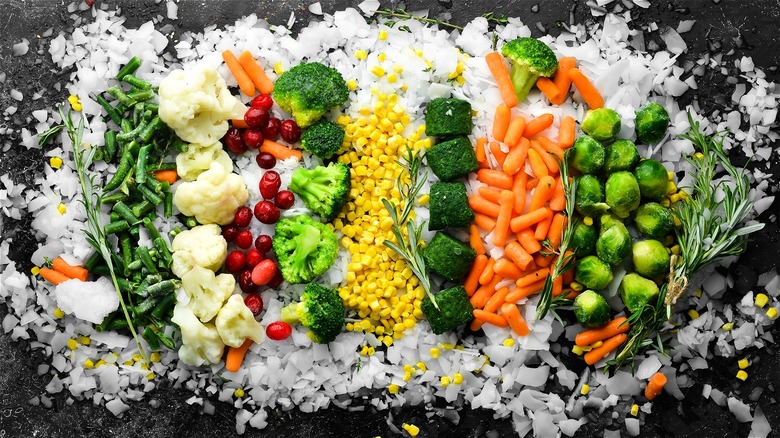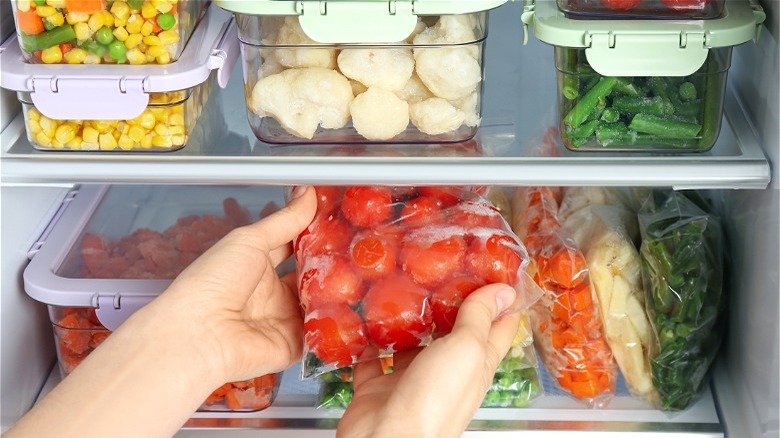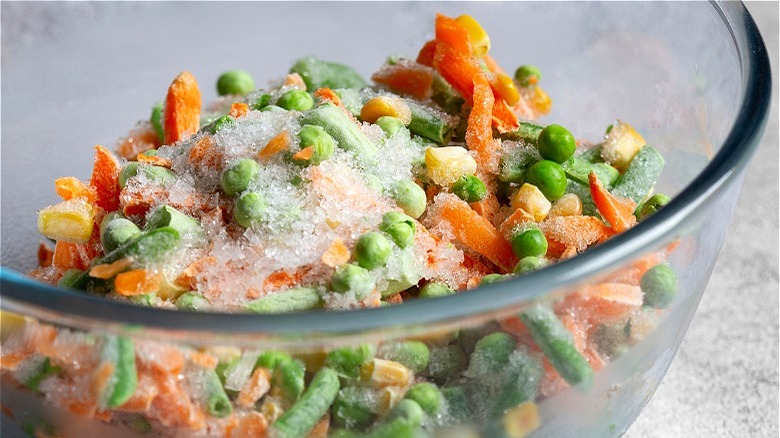Useful Tricks To Defrost Frozen Veggies
Frozen, fresh, microwaved, par-boiled, or raw–vegetables are an integral component of the human diet. According to the USDA, vegetables not only provide the body with essential vitamins like A and C, but they also serve as excellent sources of folate, dietary fiber, and potassium, depending on your preferred vegetable of choice. Whether you love downing a hefty salad of romaine lettuce or choosing a few protein-packed vegetables to add to your dinner, the truth remains that not enough Americans are eating the recommended amount of these nutrient-dense plant foods.
The USDA recommends a daily intake of 2-3 cups of vegetables for women and 3-4 cups for men between the ages of 31-59. Based on research conducted by the Centers for Disease Control and Prevention (CDC) in conjunction with the Behavioral Risk Factor Surveillance System (BRFSS) survey on fruit and vegetable intake, in 2019, only 10% of American participants were meeting the recommended consumption for vegetables. Factors affecting vegetable intake range from lack of accessibility to fresh produce and cost. Yet consumers don't always need to be eating fresh vegetables to meet nutritional standards. While the tricky side of using frozen vegetables can often be found in thawing and cooking, let's first look at the many benefits of adding frozen vegetables to your diet.
How do frozen vegetables compare to fresh?
The Washington Post outlines some of the best ways to incorporate more plant foods into your everyday diet such as planning meals ahead of time and not shying away from oil when roasting or frying. When it comes to saving money, you may want to opt for frozen varieties because typically, frozen vegetables not only have a longer shelf life but they often have a lower price tag than their fresh counterparts as well.
If you occasionally wonder whether or not frozen vegetables are just as healthy as fresh produce, you can rest easy. According to a 2017 study published by the Journal of Food Composition and Analysis, researchers analyzed the nutritional differences between fresh and frozen produce and found that fresh produce is not necessarily more nutritionally sound than frozen. In fact, in a few instances, this particular study was able to prove with certain produce samples that frozen vegetables had a more solid nutritional makeup due to the fact that fresh veggies can lose vitamins after several days of storage. According to the Academy of Nutrition and Dietetics, vegetables are typically frozen at peak consumption, sealing in all those vital nutrients (per Health). Now that you know you can chow down on frozen vegetables without losing any important nutrients, is there a way you should be defrosting these icy veggies so they don't turn to mush?
How to properly defrost frozen vegetables
Some people prefer the texture of freshly cooked vegetables over pre-frozen varieties, but before deciding which type you prefer, make sure you're defrosting your frozen vegetables correctly so you can make an accurate assessment. Martha Stewart linked up with some food experts to help you uncover whether or not you've been defrosting your food all wrong. According to William Goldfield, director of corporate communications at Dole Food Company Inc., moisture is the biggest factor to consider when thawing frozen vegetables. If dishes like stir fry or breakfast quiche are on the menu, make sure that excess moisture is removed. You can reduce moisture by sauteing your frozen veggies in a pan, defrosting them in the refrigerator, or thawing them in the microwave — just make sure to drain any extra water before adding them to your favorite recipes (per Martha Stewart).
Yet the author of the "Smart Meal Prep for Beginners," Toby Amidor advises foodies to watch their frozen foods in the microwave. For certain vegetables, defrosting can compromise structure and destroy some vital nutrients if cooked for too long (via CookingLight). One way to combat this is to not defrost your frozen vegetables at all. In fact, frozen vegetables can be a great addition to your favorite smoothie. Whichever way you plan on using frozen vegetables, simply cater your method of handling based on the recipe you're planning to make.


